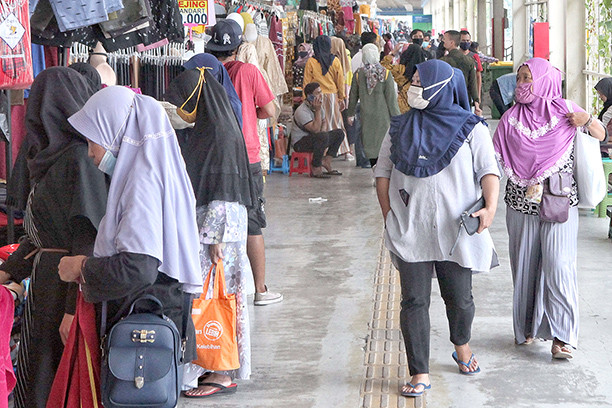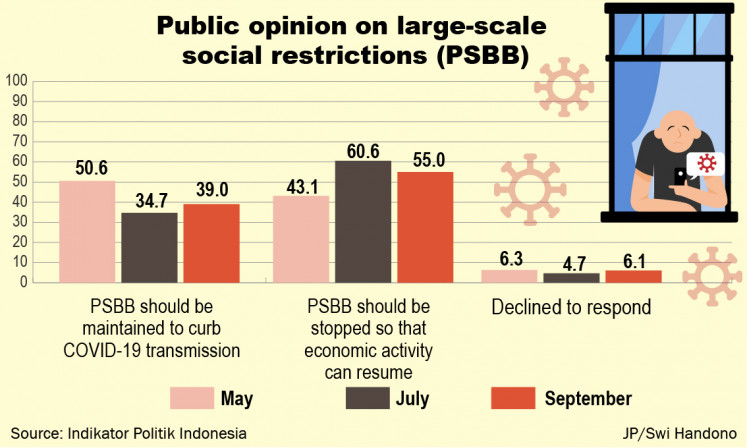Popular Reads
Top Results
Can't find what you're looking for?
View all search resultsPopular Reads
Top Results
Can't find what you're looking for?
View all search resultsMost residents want restrictions to be lifted: Survey
Change text size
Gift Premium Articles
to Anyone
M
ost residents want the large-scale social restrictions (PSBB), imposed to curb COVID-19 transmission, to end so the economy can be resumed, a survey by pollster Indikator Politik Indonesia shows.
The survey on COVID-19 mitigation related to economic interest and health, conducted from Sept 24 involving 30 to 1,200 respondents in each of the 34 provinces, showed that 55 percent of respondents wanted the PSBB policy to be stopped to support the economy.
The poll revealed that 39 percent of respondents wanted the PSBB to be continued in order to tackle coronavirus transmission, the pollster executive director Burhanuddin Muhtadi said.
“More people want the PSBB to be lifted than those who want them to be maintained, probably because even among those who are pro-health, [they see] the policy is conducted half-heartedly in many regions. They think the PSBB policy is not the only savior for their current condition,” he said in a press conference on Sunday.
Burhanuddin said perception on PSBB implementation fluctuated between May and September, according to several surveys conducted by Indikator.
He explained that the current figure contrasted with a similar survey in May, when 50.6 percent of respondents wanted the government to continue PSBB, while only 43.1 percent wanted the policy to be ended.
There was also a change in perception in July, when 60.6 percent of respondents wanted PSBB to end and only 34.7 percent wanted the policy to stay in place.
“Probably in July people were tired of being at home following the government’s order but at the same time their savings started to run out. So when the restrictions were loosened, they said ‘Ok, that is enough of PSBB’. However, in September when the restrictions were eased, the economic recovery that people wanted did not happen,” he continued.
In September, the approval rating of the government’s COVID-19 handling was 66.3 percent. The figure increased from 60.2 percent who said they were satisfied with the government’s COVID-19 management in a July survey. (JP/Swi Handono)The attitude is also reflected in the public’s view on whether health or the economy must be prioritized.
In the September survey, 60.4 percent said the government must prioritize public health, compared to only 45 percent in July and 60.7 percent in May.
The recent survey revealed that 36.2 percent of respondents said they wanted the government to prioritize the economy, compared to 47.9 percent in July and 33.9 percent in May.
Burhanuddin further revealed that 45.5 percent of respondents in the poll said they were worried about COVID-19, compared to 45.6 percent who said they were only a little bit worried, while 6.6 percent were not that worried and the remaining 2 percent said they were not worried at all.
Burhanuddin said those who were very worried about COVID-19 tended to want the government to prioritize health over the economy, while the rest wanted the economy to be the main focus in COVID-19 handling.
The survey also showed that public trust and satisfaction with President Joko “Jokowi” Widodo’s administration has increased slightly.
In September, the approval rating of the government’s COVID-19 handling was 66.3 percent. The figure increased from 60.2 percent who said they were satisfied with the government’s COVID-19 management in a July survey.
Burhanuddin explained that those in the lower income brackets and with lower levels of education tended to be satisfied with the government, while those in higher income brackets and with a higher level of education had the opposite view. (ami)











